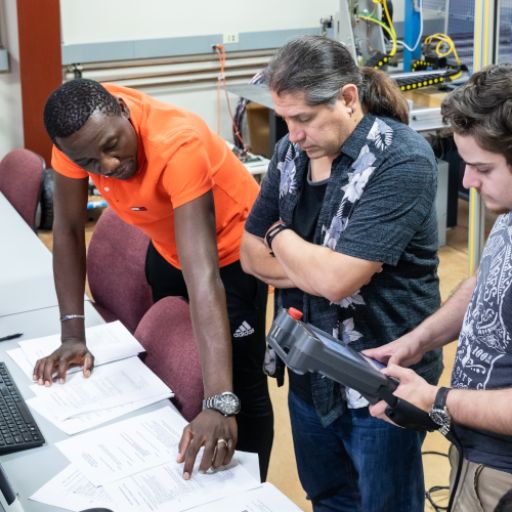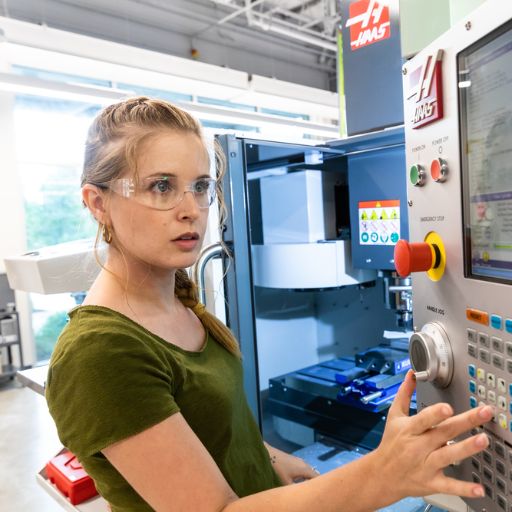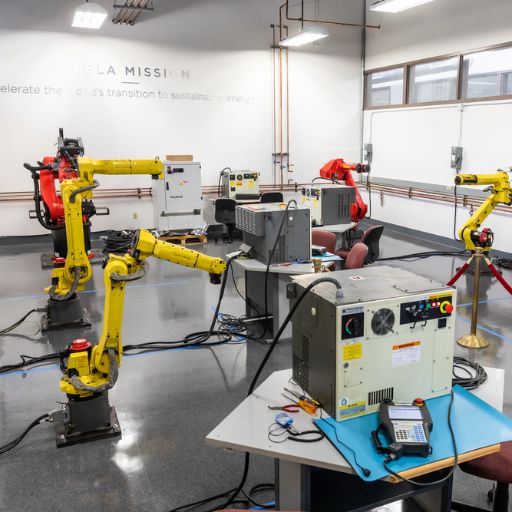The modern factory relies on sophisticated computer technology to run operations. Nowadays, factory technicians need specialized skills to operate equipment effectively. As a result, experienced factory workers with a bachelor of manufacturing engineering degree are in high demand.
Many manufacturing employees already have an associate degree. Now they can turn that degree into a bachelor of applied technology and take on more responsibility and earn higher wages.
In this Article
What Is a Bachelor of Applied Technology?
A bachelor of applied technology (BAT), is a four-year degree, just like a bachelor of science (BS). The goal of the BAT is to move graduates into the workforce with new skills, earning more money than they would with a high school diploma or associate’s degree.
BATs aren’t available for all degree programs. Most community colleges offer BAT degrees only for in-demand fields, such as manufacturing. At Austin Community College, the bachelor degree programs are part of an industry and statewide initiative to train more workers to meet employer demand.
Here’s how most BAT degree programs work.
BAT Coursework
Colleges develop applied technology degrees to teach the specific skills of a job, industry, or career. That’s where the “applied technology” comes in. So for instance, a bachelor of manufacturing engineering would focus on the technical knowledge that a manufacturing manager needs to supervise technicians and run a plant.
The Community College Connection
BAT degree programs generally follow a similar track. A student gets their associate degree in a related field at a community college. Then, they enroll in the BAT program at their school. Their associate’s degree fulfills the requirements of the first two years of the BAT, and the student can finish their BAT in another two years.
Affordability
A BAT degree tends to be more affordable than a BS degree at a four-year college. That’s because they are most often community college programs, where tuition is much lower than at four-year schools. A BAT degree is an opportunity for students who can’t afford a traditional college education to enhance their earning potential.
Accreditation
As with BS degree programs, BAT programs must have accreditation. Accreditation signifies that a community college or four-year institution offers a high quality education. Often, a degree program has separate accreditation. At Austin Community College, the BAT Manufacturing Engineering Technology is accredited by the Texas Higher Education Coordinating Board (THECB) and the Southern Association of Colleges and Schools Commission on Colleges (SACSCOS).
Top Manufacturing Skills
The $7 trillion U.S. manufacturing sector encompasses the smallest mom and pop bakeries to giant factories that employ thousands. While these companies may not have much in common, they share some requirements. They need workers who understand the products they make, the machinery needed to make these products, and the systems that make everything work efficiently.
The following are some of the top manufacturing skills that employees need in the manufacturing industry.
Automation Controls and Robotics
Modern factories employ robots to perform the repetitive tasks that workers once did. Now it’s up to the workers to control the robots and make sure they follow their programmed instructions. This is a top skill for factory employees. They need to know the ins and outs of robotic programming languages, uses of machine vision, and artificial intelligence.
Continuous Improvement Methods
Manufacturing uses several methodologies to improve process quality and control output. Employees should have experience with many of these methods. These methods include Six Sigma, ISO 9000, Total Quality Management, lean manufacturing, and more.
Manufacturing and Production
Plant design and layout, resource planning, scheduling, line balancing to reduce waste and increase efficiency, and production planning are some of the important skills that manufacturing companies look for. Operations managers need to know how a factory works and how to run their operations efficiently.
HMI, SCADA, and PLC
Factory operators, whether technicians, supervisors, or managers, must have software skills. Modern factories are smart factories – everything is interconnected through sensors and the Internet. Each component of the manufacturing process produces data, and that data must be compiled, tracked, and analyzed.
The following are some smart factory areas of expertise.
- HMI. Human-machine interface. The dashboard or monitor that a technician uses to control a machine.
- SCADA. Supervisory control and data acquisition. SCADA enables factories to control processes, gather data, and interface with machinery.
- PLC. Programmable logic controller. The PLC is a coding language that directs a machine or factory process.
- Data analytics. Factories generate vast amounts of information. Data analytics has become a huge part of smart factory operations.
Supply Chain Management
The global supply chain is complex and not easily understood. Managing a company’s supply chain from raw materials to finished products is a huge challenge. Companies need employees who can see the big picture and who can develop processes to increase efficiency and reduce risk.
Leadership and Teamwork
Manufacturing companies are looking for supervisors and managers who have soft skills, not just technical expertise. Being able to work as part of a team, to take ownership of a project or process, and to communicate clearly with others are all valuable abilities. Sometimes these skills come with experience. Other times, a BAT can help workers develop leadership skills. Either way, employees who focus on these skills can often stand out from the crowd when it comes to getting a job in manufacturing.
Bachelor of Manufacturing Engineering Wages
Manufacturing positions include production worker, machine operator, quality technician, operations manager and industrial engineer. While a production worker may only need a high school diploma or associate’s degree, employees who have a bachelor’s degree or higher are more likely to move up the ranks.
- According to the U.S. Bureau of Labor Statistics, a factory worker makes a median salary of $37,710 averaged across all industrial jobs.
- The median salary for supervisors was just over $63,500 as of 2022.
- Industrial production managers made a median annual salary of $103,150.
Note: salaries depend on a number of factors, including industry, years of experience, and location.
Explore ACC’s Bachelor of Manufacturing Engineering Degree
Take advantage of your industrial manufacturing associate degree and job experience and explore ACC’s bachelor of manufacturing degree program. This in-depth bachelor’s degree program will prepare you for the factory of the future with affordable in-district tuition, internship and job placement opportunities, and focused instruction. Discover ACC’s BAT in Manufacturing Engineering Technology today.
Tags: BAT Manufacturing, BAT Manufacturing Engineering degree, BMET
Back to Top




